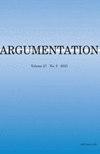Ethotic arguments, such as arguments from expert opinion and ad hominem arguments, play an important role in communication practice. In this paper, we argue that there is another type of reasoning from ethos, in which people argue about actions in the world. These subspecies of ethotic arguments are very common in public debates: societies are involved in heated disputes about what should be done with monuments of historical figures such as Stalin or Colston: Should we demolish the building they funded? Should we revere their statues? Should the street named after them be renamed?; and the general public vividly argue about what should be done with the legacy of producers, directors and actors in debates of the #MeToo movement: Should their new movies be distributed? Should their scenes be deleted from motion pictures? Should their stars from the Hollywood Walk of Fame be removed? Many arguments in these debates boil down to the character of the public figures: He was a slave trader!—But he is a part of our history; He harassed a young girl!—But he is an important actor. The reasoning step here is legitimised by the association between a person and an extra-linguistic object: the association between a historical figure and their statue or between an actor and their movie. The nature of this association is explained in the paper using Peirce’s theory of signs. We propose to extend an existing approach to patterns of reasoning from ethos that will help us to shed new light on ethotic argumentation and open an avenue for a systematic account of these unexplored argument forms.


